Dates
10-11 June 1972 (40th running)
Distance covered by the winners: 344 laps or 4,691.343 km (an average of 195.473 kph).
The winners…
For his sixth 24 Hours, and four years after his stunning nighttime performance in the rain without wipers, Henri Pescarolo triumphed and went on to become in 1973 then 1974 the only French driver to reach the top step on the podium at Le Mans three times in a row. Graham Hill had not participated in the race since 1966…the year of Pescarolo's rookie 24 Hours. The victory made him the only driver to win an F1 world championship (1962 and 1968), the Indianapolis 500 (1966) and Le Mans. Pescarolo's exceptional track record also includes five wins at the Monaco Grand Prix. The French-British duo won the race after a lengthy duel with teammates François Cevert and Howden Ganley. The two driver line-ups gave Matra a one-two for the first victory by a French marque since Talbot-Lago in 1950, and in front of French President Georges Pompidou on site to give the start that year. Two more wins followed in 1973 then 1974 with an audibly recognizable and appreciated 3-liter V12 engine.
…and other stories from the top 10
Though Ferrari had not participated in the 24 Hours as a factory team seeking the overall win since 1971, one of its road sportsters was a major contender at Le Mans during the first half of the 1970s. In 1972, the 365 GTB/4 "Daytona" pulled off a remarkable hat trick from fifth to ninth place thanks to long-time Ferrari partner teams Charles Pozzi, North American Racing Team (NART), Scuderia Filipinetti and Ecurie Francorchamps.
Another outstanding GT from this period, the Ford Capri finished its first 24 Hours in the top 10 with 10th place for Gerry Birrell and Claude Bourgoignie.
Previous and future Le Mans winners also figured in the top 10: Nino Vaccarella, victorious in 1964 (fourth with Alfa Romeo) and Derek Bell (eighth with Ferrari) who went on to win five times between 1975 and 1987. Second with Porsche, Reinhold Joest is now the winningest team owner in the history of the 24 Hours.
Auto racing in 1972
Former driver turned highly successful team owner Roger Penske won the first of his 18 wins at the Indianapolis 500. In 2023, he will partner with Porsche for its return to the top endurance class, Hypercar, for the 100th running of the 24 Hours.
In 1972, Emerson Fittipaldi became the first Brazilian Formula 1 world champion. Half a century later, will Alpine driver André Negrão become the first citizen of that country to win Le Mans?
Also in 1972
Bangladesh: a concert and a film – The first major charity concert in rock history on 1 August 1971 in New York was organized by former Beatle George Harrison and Indian musician Ravi Shankar. The Concert for Bangladesh was released in theatres in 1972.
The environment: first awareness – As the 40th 24 Hours was underway, the city of Stockholm hosted the first United Nations conference on the environment on 5-16 June.
Prelude to an upcoming scandal – On 17 June in the middle of the American election campaign, five men supposedly plumbers were arrested for installing listening devices in the headquarters of the Democratic party, marking the beginning of the Watergate scandal.
Last (provisional?) rendez-vous with the moon – From 7-19 December, Gene Cernan, Ronald Evans and Harrison Schmitt carried out the latest manned lunar mission on board Apollo 17.
PHOTOS: LE MANS (SARTHE, FRANCE), CIRCUIT DES 24 HEURES, 24 HOURS OF LE MANS, 10-11 JUNE 1972. At top: Henri Pescarolo on his way to his first Le Mans win. He would go on to score two more with Matra (1973 and 1974) and a fourth with Porsche (1984). Below: the first of the five Ferrari Daytonas ranked in the top 10 was fielded by French importer Charles Pozzi thanks to the fifth place overall finish of Jean-Claude Andruet and Claude Ballot-Léna.


